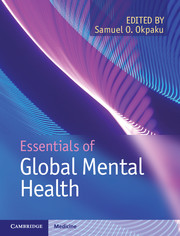Book contents
- Essentials of Global Mental Health
- Essentials of Global Mental Health
- Copyright page
- Dedication
- Contents
- Contributors
- Preface
- Acknowledgments
- Introduction
- Section 1 History and background of global mental health
- Section 2 Advocacy and reduction of stigma
- Chapter 6 The voice of the user/survivor
- Chapter 7 Internalized stigma
- Chapter 8 Definition and process of stigma
- Chapter 9 Stigmatization and exclusion
- Chapter 10 Grassroots movements in mental health
- Chapter 11 The rise of consumerism and local advocacy
- Chapter 12 Programs to reduce stigma in epilepsy and HIV/AIDS
- Section 3 Systems of development
- Section 4 Systems of development for special populations
- Section 5 Gender and equality
- Section 6 Human resources and capacity building
- Section 7 Depression, suicide, and violence
- Section 8 Research and monitoring the progress of countries
- Epilogue
- Index
Chapter 6 - The voice of the user/survivor
from Section 2 - Advocacy and reduction of stigma
Published online by Cambridge University Press: 05 March 2014
- Essentials of Global Mental Health
- Essentials of Global Mental Health
- Copyright page
- Dedication
- Contents
- Contributors
- Preface
- Acknowledgments
- Introduction
- Section 1 History and background of global mental health
- Section 2 Advocacy and reduction of stigma
- Chapter 6 The voice of the user/survivor
- Chapter 7 Internalized stigma
- Chapter 8 Definition and process of stigma
- Chapter 9 Stigmatization and exclusion
- Chapter 10 Grassroots movements in mental health
- Chapter 11 The rise of consumerism and local advocacy
- Chapter 12 Programs to reduce stigma in epilepsy and HIV/AIDS
- Section 3 Systems of development
- Section 4 Systems of development for special populations
- Section 5 Gender and equality
- Section 6 Human resources and capacity building
- Section 7 Depression, suicide, and violence
- Section 8 Research and monitoring the progress of countries
- Epilogue
- Index
Summary
Information
- Type
- Chapter
- Information
- Essentials of Global Mental Health , pp. 63 - 71Publisher: Cambridge University PressPrint publication year: 2014
Accessibility standard: Unknown
Why this information is here
This section outlines the accessibility features of this content - including support for screen readers, full keyboard navigation and high-contrast display options. This may not be relevant for you.Accessibility Information
- 1
- Cited by
